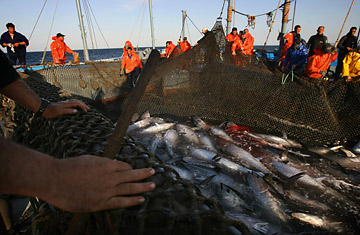
Fishermen gathering in the nets with their catch of tuna off the Straits of Gibraltar
If an army marches on its stomach, then the key item in the kit bags of the Roman legions that conquered southern Europe about 2,000 years ago was dried bluefin tuna. But having survived the demands of the Roman conquest, the species — each of which can weigh as much as 1,500 lbs. and live as long as 40 years — might finally have met its match in the contemporary global appetite for sushi.
If environmentalists and marine scientists are right, the world's remaining stocks of bluefin tuna, 90% of which are in the Mediterranean, could be on the verge of extinction. Says Alain Fonteneau, a marine biologist at France's government-run Institute for Development Research in Montpellier: "If we do nothing, in five years we will fish the last bluefin tuna."
But not everyone is ready to heed the warning. A weeklong international meeting to save the species ended in splenetic arguments Monday night, as European officials thwarted a proposal by the U.S. and environmental groups to impose a partial moratorium on bluefin-fishing and to drastically reduce catch quotas.
Officials from the 46 members of the International Consortium for the Conservation of the Atlantic Tunas (ICCAT) had spent days behind closed doors in the Moroccan city of Marrakech, battling over a rescue plan for the species. Several smaller ICCAT members such as Guatemala and Panama had initially backed a proposal supported by the U.S. and environmental groups to halt all bluefin-fishing for nine months of the year and to crack down hard on violators. But European officials persuaded them to adopt instead a reduced quota of 22,000 tons in 2009 and 19,950 tons in 2011. That certainly represents a sharp drop from last year's estimated global sales of 61,000 tons of bluefin tuna — and even from this year's official quota of about 29,000 tons — but it's still far above the 15,000 tons that marine scientists advise is the limit that can be fished without the species becoming extinct.
"The meeting's been a complete disaster," says Sergi Tudela of the World Wildlife Fund (WWF). "The measures that have been adopted will drive the bluefin tuna to collapse." Not so, say European officials, who contend that their quota plan was the best deal possible, in part because it won the backing of Arab countries on the Mediterranean, who perceive ICCAT as controlled by the world's major fishing powers — the U.S., Canada, Japan and Europe. "You need to have all of those involved to feel ownership over this," says Pierre Amilhat, head of the European Commission's Directorate General for Maritime Affairs and Fisheries, who led Europe's negotiators in Marrakech. "The situation is serious. No one denies that," Amilhat says. "But we think the measures we're putting in place will deal with that."
Conservation groups are enraged by the outcome. The WWF and Greenpeace announced in Marrakech that they would launch a global boycott of all restaurants and supermarkets that serve or stock bluefin tuna. They will also apply to have the species declared endangered under CITES, the international Convention on International Trade in Endangered Species of Wild Fauna and Flora; a move that would effectively ban the global trade in bluefin tuna. A similar campaign to ban ivory has largely succeeded in reviving the world's elephant herds. And both groups plan to end their long connection to ICCAT. "The game is over," said Sebastian Losada, a Spanish campaigner for Greenpeace, in a statement from Marrakech on Monday night. He said the meeting had showed "government and industry ruthlessly bargaining for the last tuna."
The surge in bluefin-tuna-fishing over the past decade has been driven by the proliferation of sushi restaurants across the world. The bluefin industry, once the province of rustic local fishing fleets in the Mediterranean, was last year worth about $1.6 billion. Today tuna fleets use high-tech spotter planes buzzing over the Med during the summertime tuna-spawning season in search of shoals that have escaped the trappers. The industry's major players are massive multinational corporations like Mitsubishi, the world's biggest tuna trader — Japan imports the bulk of bluefin tuna caught in the Med. Some of the larger companies have created state-of-the-art tuna ranches in the Med's deep waters, where bluefin tuna swim into giant nets and are fattened over a period of months before being hauled out, processed in floating factories and then exported.
The Mediterranean tuna trade earns millions in tax revenues for Europe and employs thousands of Spanish and Italian fishermen, whose livelihoods have been pummeled by declining stocks in recent years. The specter of further job losses amid a global economic downturn has militated against European officials pressing for sharper cuts in bluefin-fishing. "None of the [fisheries] commissioners want to come back home and say, 'I have saved bluefin tuna but I have ruined my fishing industry'," says Fonteneau, who estimates that fishermen make as much in one month selling high-priced bluefin tuna as they do during an entire year of regular fishing.
Spain's negotiator in Marrakech, fisheries official Fernando Curcio, said on Tuesday that "it was important to us to protect the interests of our small fishing fleets." Yet Europe's fisheries official Amilhat says that, inevitably, many fishermen will lose their jobs as fleets shrink in response to reduced catch quotas. And if the environmentalists' boycott campaign further cuts bluefin consumption, the species may yet have a fighting chance.
—With reporting by Lisa Abend / Madrid
ETX: